人教版八年级英语上册 Unit 9 Can you come to my party? Section A Grammar Focus-3c 课件(共48张PPT)
文档属性
| 名称 | 人教版八年级英语上册 Unit 9 Can you come to my party? Section A Grammar Focus-3c 课件(共48张PPT) |
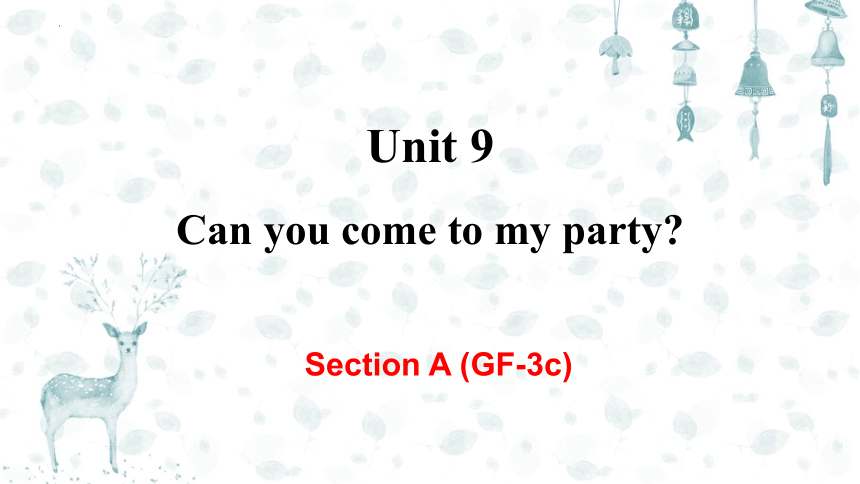
|
|
| 格式 | zip | ||
| 文件大小 | 1.8MB | ||
| 资源类型 | 教案 | ||
| 版本资源 | 人教新目标(Go for it)版 | ||
| 科目 | 英语 | ||
| 更新时间 | 2022-07-22 00:00:00 | ||
图片预览

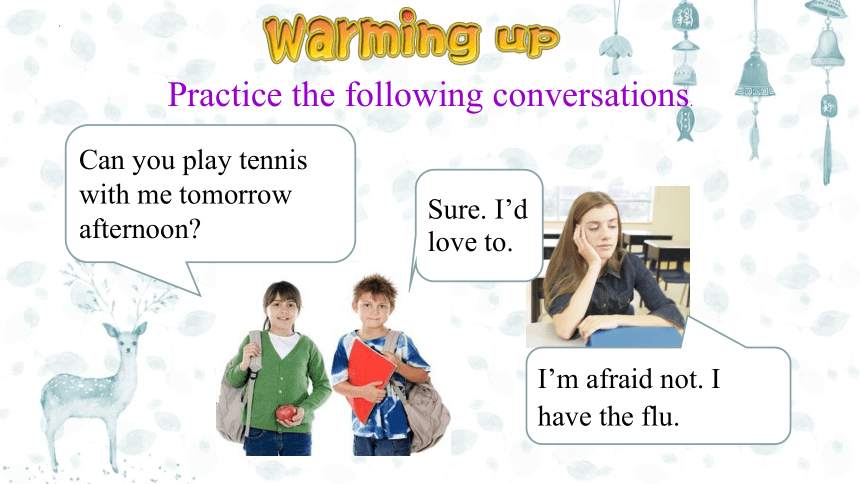
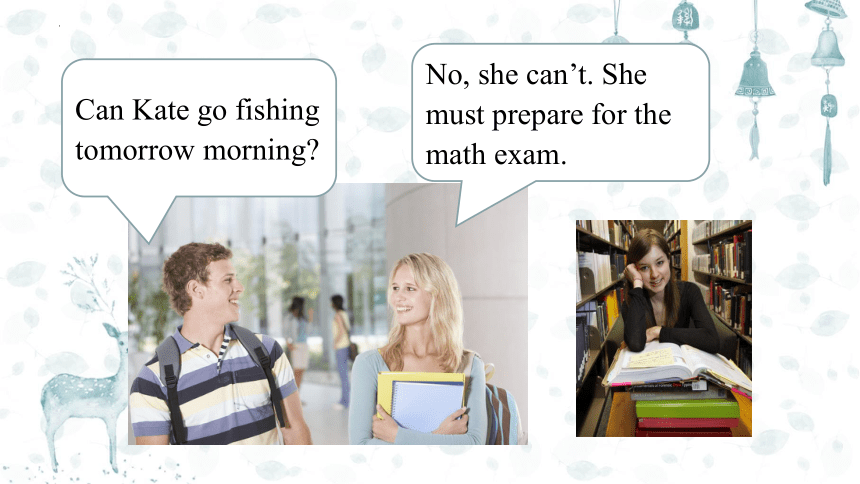
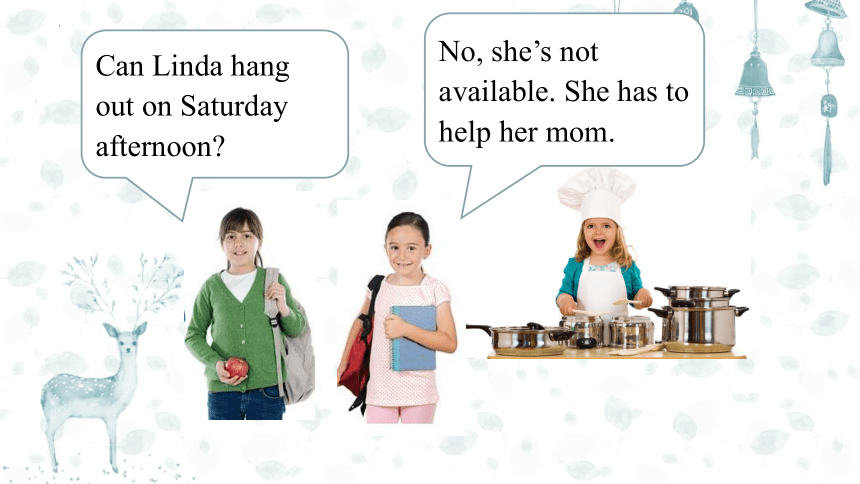
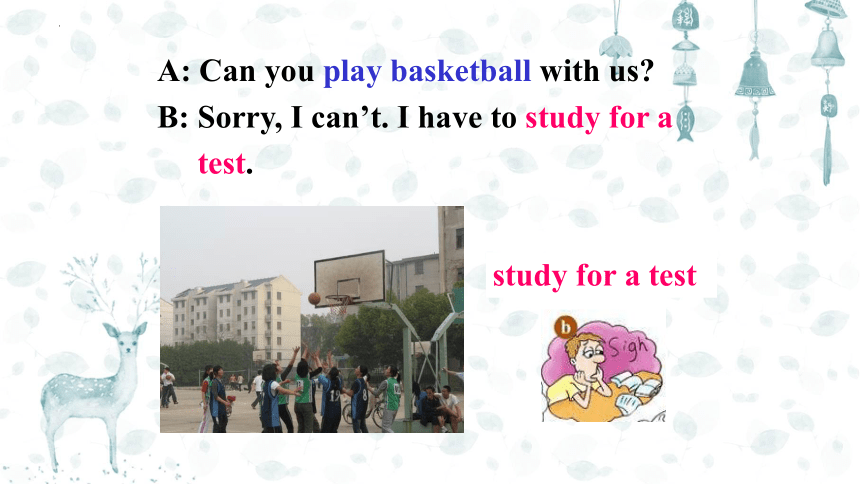
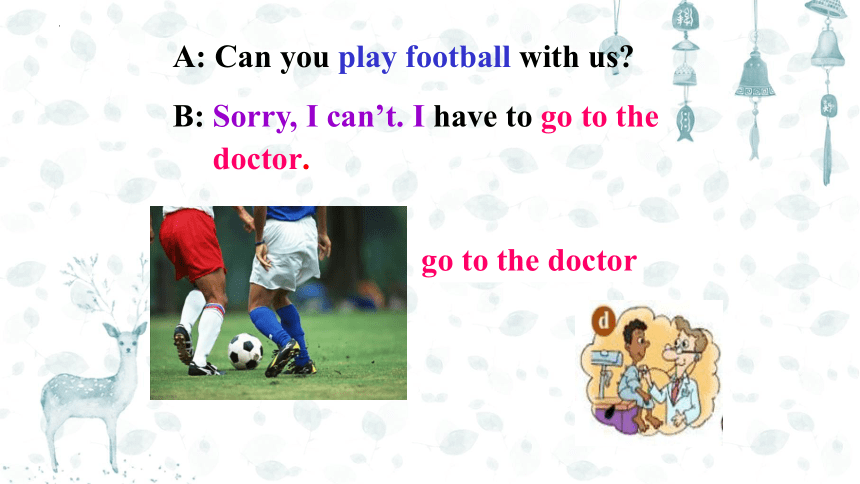
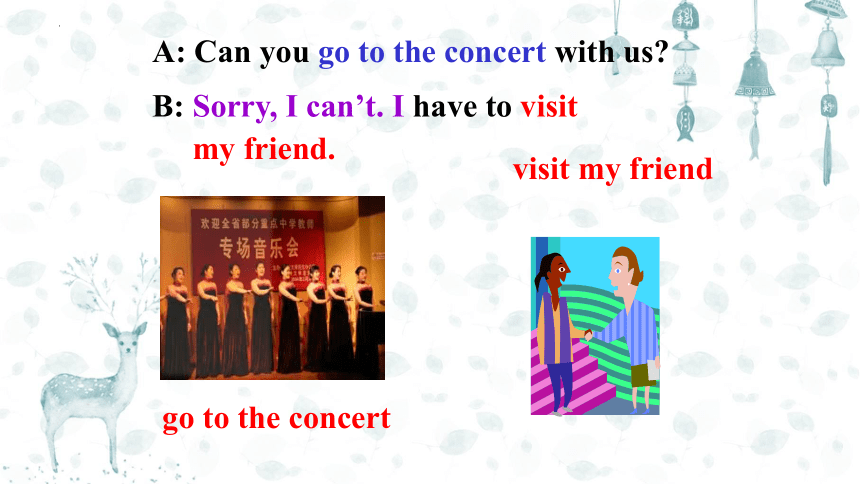
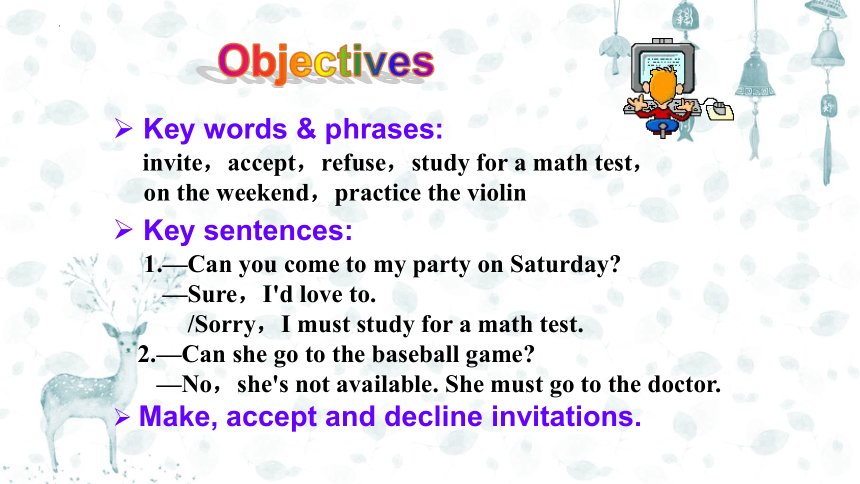
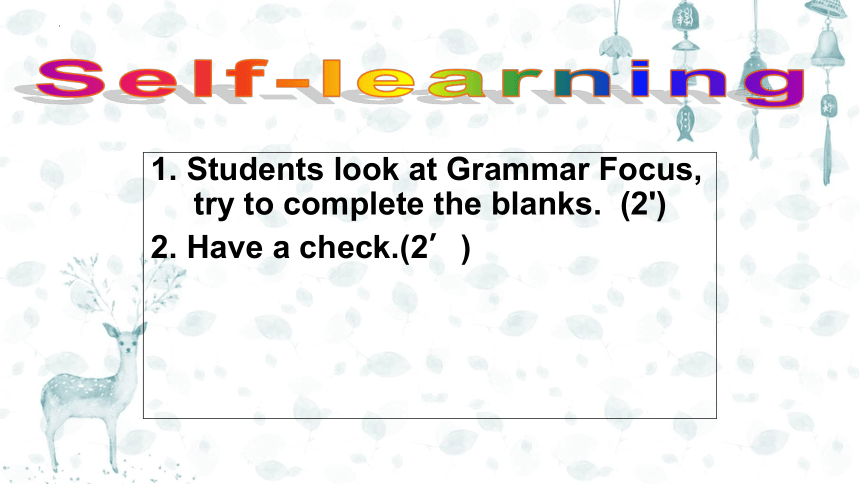
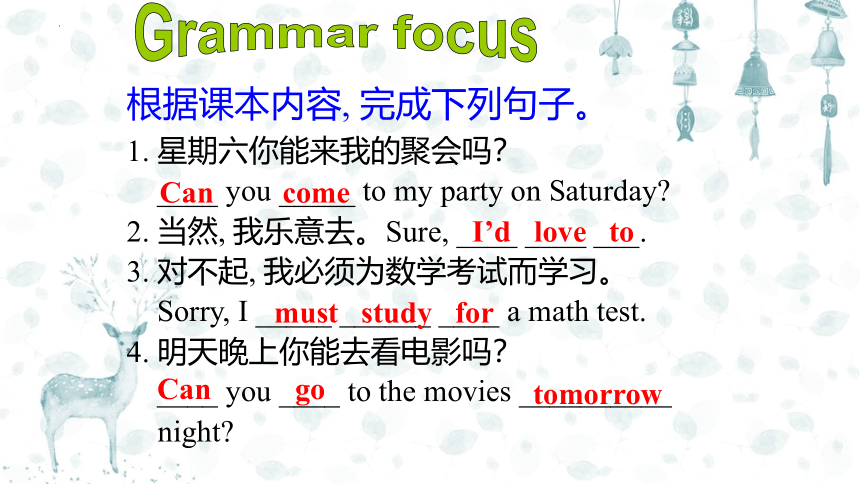
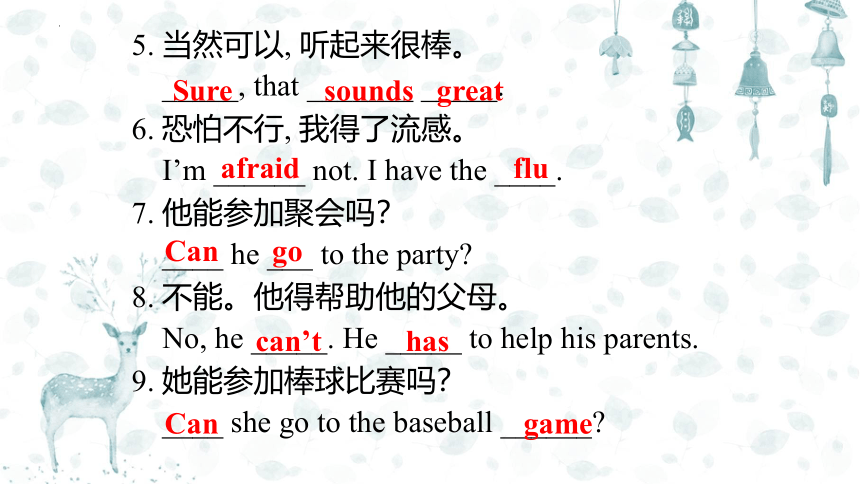
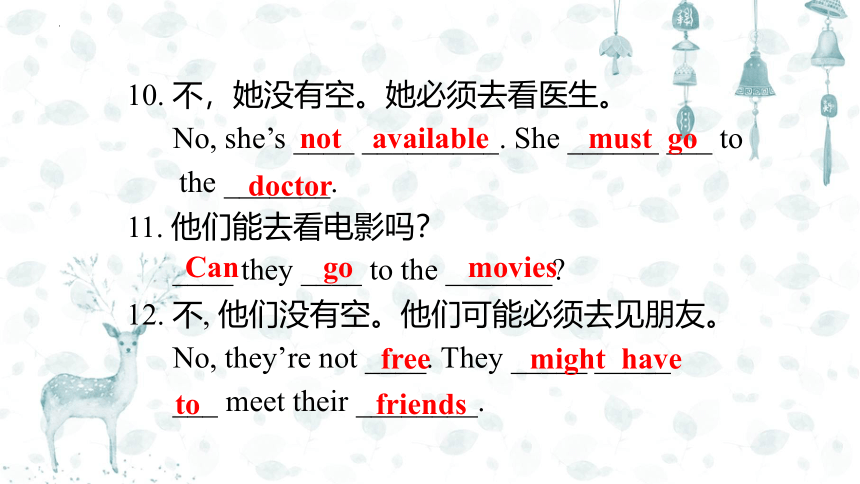
文档简介
(共48张PPT)
Section A (GF-3c)
Unit 9
Can you come to my party
Can you play tennis with me tomorrow afternoon
Sure. I’d love to.
I’m afraid not. I have the flu.
Practice the following conversations.
Can Kate go fishing tomorrow morning
No, she can’t. She must prepare for the math exam.
Can Linda hang out on Saturday afternoon
No, she’s not available. She has to help her mom.
A: Can you play basketball with us
B: Sorry, I can’t. I have to study for a
test.
study for a test
B: Sorry, I can’t. I have to go to the
doctor.
go to the doctor
A: Can you play football with us
visit my friend
A: Can you go to the concert with us
B: Sorry, I can’t. I have to visit
my friend.
go to the concert
Key words & phrases:
invite,accept,refuse,study for a math test,
on the weekend,practice the violin
Key sentences:
1.—Can you come to my party on Saturday
—Sure,I'd love to.
/Sorry,I must study for a math test.
2.—Can she go to the baseball game
—No,she's not available. She must go to the doctor.
Make, accept and decline invitations.
Objectives
Self-learning
1. Students look at Grammar Focus, try to complete the blanks. (2')
2. Have a check.(2’)
1. 星期六你能来我的聚会吗?
____ you _____ to my party on Saturday
2. 当然, 我乐意去。Sure, ____ ____ ___.
3. 对不起, 我必须为数学考试而学习。
Sorry, I _____ ______ ____ a math test.
4. 明天晚上你能去看电影吗?
____ you ____ to the movies __________ night
Grammar focus
I’d love to
Can come
must study for
Can go
根据课本内容, 完成下列句子。
tomorrow
5. 当然可以, 听起来很棒。
_____, that _______ _____.
6. 恐怕不行, 我得了流感。
I’m ______ not. I have the ____.
7. 他能参加聚会吗?
____ he ___ to the party
8. 不能。他得帮助他的父母。
No, he _____. He _____ to help his parents.
9. 她能参加棒球比赛吗?
____ she go to the baseball ______
Sure sounds great
afraid flu
Can game
Can go
can’t has
10. 不,她没有空。她必须去看医生。
No, she’s ____ _________. She ______ ___ to the _______.
11. 他们能去看电影吗?
____ they ____ to the _______
12. 不, 他们没有空。他们可能必须去见朋友。
No, they’re not ____. They _____ _____
___ meet their ________.
not available must go
doctor
to friends
Can go movies
free might have
1. invite v. 邀请
◆invite sb. to sth.意为“邀请某人参加 ……;邀请某人到……”。如:
I’m going to invite my friends to my party this Sunday.
◆invite sb. to do sth. 意为“邀请某人做某事”。如:
The young man invited me to sing just now.
New Words
【链接】invite的名词形式是invitation。
与invitation相关的短语有:
make an invitation 发出邀请
accept an invitation 接受邀请
turn down / refuse an invitation 拒绝邀请
【运用】Ⅰ. 单项选择。
1) Lucy is shy. She would not invite her
classmates ________ dancing with her.
A. practice B. practices
C. practicing D. to practice
D
2) My friend invited me ________ the art
club, and I accepted it with pleasure.
A. join B. to join
C. joined D. joining
Ⅱ. 完成句子,每空词数不限。
1) 汤姆邀请我去他们学校。
Tom ___________________ their school.
2) 珍妮,你向米勒先生发出邀请了吗?
Jenny, did you _____________________ to Mr. Miller
B
invited me to
send an invitation
请观察下面的例句,思考它的用法,然后补全结论部分所缺的内容。
【例句】
1) I don’t know if Lily will refuse.
2) The strange man always refuses
others’ advice.
3) Why didn’t you refuse her
4) John’s father refused to stop drinking.
5) Tina can’t refuse him anything.
2. refuse v. 拒绝
【结论】
观察例句1可知,refuse可用作不及物动词。
观察例句2—5可知,refuse还可用作及物动词。refuse后面的宾语可以是名词(如例句2)、代词(如例句3)或_____________ (如例句4),也可跟双宾语(如例句5)。
动词不定式
【运用】
请将下列汉语句子译成英语。
1. 我拒绝了王丽的邀请。
______________________________________
2. 李敏不喜欢王磊,所以拒绝了他。
______________________________________
______________________________________
3. 你最好不要拒绝帮助别人。
______________________________________
I refused Wang Li’s invitation.
Li Min didn’t like Wang Lei, so she refused him.
You’d better not refuse to help others.
3. accept v. 接受
e.g. They didn’t accept his money.
他们没有接受他的钱。
accept和receive
accept和receive都用作动词,意思相近,但用法有所区别。accept意为“接受”,强调主观接受。receive意为“收到;接到”,强调客观收到,但并不意味着同意接受。如:
Ann didn’t accept her friend’s present yesterday.
I received a letter from my aunt from Canada.
【运用】
将下列句子翻译成英语。
1. 昨天下午那位著名的电影明星收到了很多
花吗?
_______________________________________
_______________________________________
2. 她决定接受这份工作。
_______________________________________
3. 我收到汤姆送我的一本字典,但我没接受。
_____________________________________
_____________________________________
Did that famous film star receive many flowers yesterday afternoon
She decided to accept this job.
I received a dictionary from Tom, but I didn’t accept it.
七年级下册我们已经学过情态动词can表示能力。
can用于表示能力,意为“能,会” 。
e.g. Tom can ride a horse.
汤姆会骑马。
Revision
can表示请求时,可用来发出邀请,这时答语比较灵活。如果接受邀请,答语可用__________________ / _______________等;如果拒绝邀请,答语可用Sorry, I must / have to ... / I’m afraid not. / Sorry, I can’t. / I’m not available等。如:
通过观察和完成Grammar Focus部分的句
子,我们可以发现can在本单元表示请求
和可能性。
Discovering
Sure, it sounds great.
Sure, I’d love to.
—Can you come to my birthday party on
Monday, Bill
—Sure, I’d love to. / Sorry, I’m afraid not.
I have to go to the doctor.
其他表邀请的句型:
Could/ Will/ Would you come to my party
Would you like to/ love to come to the party
I hope you come to my party.
How/ What about coming to my party
Can you ... 意为“你能……吗?”,可用于邀请别人或委婉地请求某人去做某事。其肯定回答常用 Sure, I’d love / like to. ,否定回答常用 I’m sorry, I can’t. / Sorry, I can’t. 等。如:
-- Can you go to the baseball game
你能去参加棒球比赛吗?
-- I’m sorry, I can’t. 对不起,我不能。
Explanation
情态动词have to与其他的情态动词如can,may,must和should 不同。
(1)这4个情态动词没有人称的变化, 而have to有。它的第三人称单数为“has to”。
You / He should study hard.
你/他应该好好学习。
He has to study hard.
他不得不好好学习。
have to 的用法
(2)这4个情态动词在一般疑问句中将它们放在句首, 在否定句中直接在他们后边加not即可。
我们以can为例:
Can he go with us 他能和我们一起去吗?
He can’t go with us.他不能和我们一起去。
而have to要加助动词do , does或 did 才可能完成其疑问、否定句。
试将下面三句话分别写成
(1)一般疑问句,并作肯定回答。
(2)否定句。
a. They have to go to the party.
Do they have to go to the party
Yes, they do.
They don’t have to go to the party.
b. He has to go to see the doctor.
Does he have to go to see the doctor
Yes, he does.
He doesn’t have to go to see the doctor.
c. She had to study for a math test yesterday.
Did she have to study for a math yesterday
Yes, she did.
She didn’t have to study for a math
yesterday.
have to 与 must
二者都有“必须”之意,但 have to 表示“客观上的需要”,有人称和时态的变化,否定形式为 don’t / doesn’t / didn’t have to (没必要);must 表示“主观上的要求”,无人称和时态的变化,否定回答一般用 needn’t 或 don't have to (不必)。mustn’t 表示“禁止”。如:
比一比
We have to wear warm clothes in winter.
冬天我们不得不穿上暖和的衣服。
(客观需要)
I must finish my homework first before I watch TV.看电视前我必须先完成作业。
(主观要求)
You don't have to tell him about it.
你不一定要把此事告诉他。
You mustn't tell him about it.
你一定不要把这件事告诉他。
—Must I be home before eight o’clock
8点之前我必须回家吗?
—Yes, you must.
/ No, you needn‘t. / No, you don’t have to.
是的,必须回家。/不,不必。
watch TV, on the weekend, my cousin,
visit my grandparents, practice the violin
1. A: What are you going to do on Saturday
B: I’m not sure. I might __________
______________.
3a
Practice
Complete the answers with might and one of the phrases in the box.
visit my
grandparents
2. A: What are you planning to do after school
B: I don’t know. ________________.
3. A: When will you finish the science homework
B: _____________________________
________________.
I might watch TV
I don’t know. I might finish it on
the weekend
4. A: Who are you going to the movies with
B: ____________________________
__________.
5. A: Are you free to come to my place on
Saturday
B: ____________________________
__________________.
I’m not sure. I might go with my cousin
I’m not sure. I might have to
practice the violin
1. Inviting: ____________________________ (can/play tennis)
Accepting: ________________________
2. Inviting: __________________________
(would like to/go to the movies)
Refusing: _____________________
Reasons: __________________________
(might have to)
Complete the sentences below. Use the words in brackets to help you.
3b
1. Can you play tennis with us
Sure. That sounds great.
2. Would you like to go to the movies on Friday
I’m afraid I can’t.
I might have to prepare for the math exam.
3. Inviting: ___________________________
(can/hang out with us tonight)
Refusing: __________________________
Reason: _____________________ (must)
4. Inviting: ___________________________
__________________________ (would like to / come to my birthday party)
Accepting: _________________________
Can you hang out with us tonight
Sorry. I am not free.
I must help my mom at home.
Would you like to come to my
birthday party
Sure. I’d love to.
指导:
1. 根据要求可知,需要我们写出一句邀请的话和接受邀请或拒绝的问答句,如果是拒绝邀请应给出理由。
2. 按提示词,用Can you… 或Would you like … 加上所做事项来询问。如果是拒绝邀请,可以想一个适当理由来说明。
Write down everything you have to do next week. Choose a day and time to have a party. Then invite classmates to your party.
3c
Group work
MON.
TUE.
WED.
THUR.
FRI.
SAT.
SUN.
Invite your classmates to your party. See if they are available.
Can you come to my party on Saturday afternoon
Sure. I’d love to.
I’m sorry. I must practice the violin on Saturday afternoon.
I’m afraid not. I have to visit my grandparents.
Exercises
一、选出合适的选项完成下列对话。
A: Hey, Bob. 1. ___________
B: I’m sorry. I have to help my parents.
A: 2. ________. How about you, Ling Ling
Can you come to my party
L: 3. _________
A: On Saturday afternoon.
L: Sorry, I can’t. 4. ____________
A: That’s too bad. 5. _____________.
L: Sure! Thanks for asking.
A. That’s too bad.
B. Can you come to my party
C. Are you going shopping with me
D. Maybe another time.
E. I have to study for a test.
F. When is it
G. I’d love to.
B
A
F
E
D
A. That’s too bad.
B. Can you come to my party
C. Are you going shopping with me
D. Maybe another time.
E. I have to study for a test.
F. When is it
G. I’d love to.
1. ____ 2. ____ 3. ____ 4. _____ 5. _____
B
A
F
E
D
二、将下列对话翻译成英语。
1. —下周二你能来参加我的生日聚会吗
—恐怕不行,我必须去看我奶奶。
— Can you come to my birthday party
next Tuesday
— I’m afraid not. I must go to see my
grandmother.
2. —明天他们能去钓鱼吗
—不能,他们得准备考试。
—Can they go fishing tomorrow
—No, they can’t. They have to
prepare for the test.
Key words & phrases:
invite,accept,refuse,study for a math test,
on the weekend,practice the violin
Key sentences:
1.—Can you come to my party on Saturday
—Sure,I'd love to.
/Sorry,I must study for a math test.
2.—Can she go to the baseball game
—No,she's not available. She must go to the doctor.
Make, accept and decline invitations.
Summary
你的朋友邀请你去看电影,请根据在3c中所填写的信息编写一个与你朋友的对话。
A: Can you go to the movie on Saturday evening
B: Sorry, I can’t. I have to …
Thank You!
Section A (GF-3c)
Unit 9
Can you come to my party
Can you play tennis with me tomorrow afternoon
Sure. I’d love to.
I’m afraid not. I have the flu.
Practice the following conversations.
Can Kate go fishing tomorrow morning
No, she can’t. She must prepare for the math exam.
Can Linda hang out on Saturday afternoon
No, she’s not available. She has to help her mom.
A: Can you play basketball with us
B: Sorry, I can’t. I have to study for a
test.
study for a test
B: Sorry, I can’t. I have to go to the
doctor.
go to the doctor
A: Can you play football with us
visit my friend
A: Can you go to the concert with us
B: Sorry, I can’t. I have to visit
my friend.
go to the concert
Key words & phrases:
invite,accept,refuse,study for a math test,
on the weekend,practice the violin
Key sentences:
1.—Can you come to my party on Saturday
—Sure,I'd love to.
/Sorry,I must study for a math test.
2.—Can she go to the baseball game
—No,she's not available. She must go to the doctor.
Make, accept and decline invitations.
Objectives
Self-learning
1. Students look at Grammar Focus, try to complete the blanks. (2')
2. Have a check.(2’)
1. 星期六你能来我的聚会吗?
____ you _____ to my party on Saturday
2. 当然, 我乐意去。Sure, ____ ____ ___.
3. 对不起, 我必须为数学考试而学习。
Sorry, I _____ ______ ____ a math test.
4. 明天晚上你能去看电影吗?
____ you ____ to the movies __________ night
Grammar focus
I’d love to
Can come
must study for
Can go
根据课本内容, 完成下列句子。
tomorrow
5. 当然可以, 听起来很棒。
_____, that _______ _____.
6. 恐怕不行, 我得了流感。
I’m ______ not. I have the ____.
7. 他能参加聚会吗?
____ he ___ to the party
8. 不能。他得帮助他的父母。
No, he _____. He _____ to help his parents.
9. 她能参加棒球比赛吗?
____ she go to the baseball ______
Sure sounds great
afraid flu
Can game
Can go
can’t has
10. 不,她没有空。她必须去看医生。
No, she’s ____ _________. She ______ ___ to the _______.
11. 他们能去看电影吗?
____ they ____ to the _______
12. 不, 他们没有空。他们可能必须去见朋友。
No, they’re not ____. They _____ _____
___ meet their ________.
not available must go
doctor
to friends
Can go movies
free might have
1. invite v. 邀请
◆invite sb. to sth.意为“邀请某人参加 ……;邀请某人到……”。如:
I’m going to invite my friends to my party this Sunday.
◆invite sb. to do sth. 意为“邀请某人做某事”。如:
The young man invited me to sing just now.
New Words
【链接】invite的名词形式是invitation。
与invitation相关的短语有:
make an invitation 发出邀请
accept an invitation 接受邀请
turn down / refuse an invitation 拒绝邀请
【运用】Ⅰ. 单项选择。
1) Lucy is shy. She would not invite her
classmates ________ dancing with her.
A. practice B. practices
C. practicing D. to practice
D
2) My friend invited me ________ the art
club, and I accepted it with pleasure.
A. join B. to join
C. joined D. joining
Ⅱ. 完成句子,每空词数不限。
1) 汤姆邀请我去他们学校。
Tom ___________________ their school.
2) 珍妮,你向米勒先生发出邀请了吗?
Jenny, did you _____________________ to Mr. Miller
B
invited me to
send an invitation
请观察下面的例句,思考它的用法,然后补全结论部分所缺的内容。
【例句】
1) I don’t know if Lily will refuse.
2) The strange man always refuses
others’ advice.
3) Why didn’t you refuse her
4) John’s father refused to stop drinking.
5) Tina can’t refuse him anything.
2. refuse v. 拒绝
【结论】
观察例句1可知,refuse可用作不及物动词。
观察例句2—5可知,refuse还可用作及物动词。refuse后面的宾语可以是名词(如例句2)、代词(如例句3)或_____________ (如例句4),也可跟双宾语(如例句5)。
动词不定式
【运用】
请将下列汉语句子译成英语。
1. 我拒绝了王丽的邀请。
______________________________________
2. 李敏不喜欢王磊,所以拒绝了他。
______________________________________
______________________________________
3. 你最好不要拒绝帮助别人。
______________________________________
I refused Wang Li’s invitation.
Li Min didn’t like Wang Lei, so she refused him.
You’d better not refuse to help others.
3. accept v. 接受
e.g. They didn’t accept his money.
他们没有接受他的钱。
accept和receive
accept和receive都用作动词,意思相近,但用法有所区别。accept意为“接受”,强调主观接受。receive意为“收到;接到”,强调客观收到,但并不意味着同意接受。如:
Ann didn’t accept her friend’s present yesterday.
I received a letter from my aunt from Canada.
【运用】
将下列句子翻译成英语。
1. 昨天下午那位著名的电影明星收到了很多
花吗?
_______________________________________
_______________________________________
2. 她决定接受这份工作。
_______________________________________
3. 我收到汤姆送我的一本字典,但我没接受。
_____________________________________
_____________________________________
Did that famous film star receive many flowers yesterday afternoon
She decided to accept this job.
I received a dictionary from Tom, but I didn’t accept it.
七年级下册我们已经学过情态动词can表示能力。
can用于表示能力,意为“能,会” 。
e.g. Tom can ride a horse.
汤姆会骑马。
Revision
can表示请求时,可用来发出邀请,这时答语比较灵活。如果接受邀请,答语可用__________________ / _______________等;如果拒绝邀请,答语可用Sorry, I must / have to ... / I’m afraid not. / Sorry, I can’t. / I’m not available等。如:
通过观察和完成Grammar Focus部分的句
子,我们可以发现can在本单元表示请求
和可能性。
Discovering
Sure, it sounds great.
Sure, I’d love to.
—Can you come to my birthday party on
Monday, Bill
—Sure, I’d love to. / Sorry, I’m afraid not.
I have to go to the doctor.
其他表邀请的句型:
Could/ Will/ Would you come to my party
Would you like to/ love to come to the party
I hope you come to my party.
How/ What about coming to my party
Can you ... 意为“你能……吗?”,可用于邀请别人或委婉地请求某人去做某事。其肯定回答常用 Sure, I’d love / like to. ,否定回答常用 I’m sorry, I can’t. / Sorry, I can’t. 等。如:
-- Can you go to the baseball game
你能去参加棒球比赛吗?
-- I’m sorry, I can’t. 对不起,我不能。
Explanation
情态动词have to与其他的情态动词如can,may,must和should 不同。
(1)这4个情态动词没有人称的变化, 而have to有。它的第三人称单数为“has to”。
You / He should study hard.
你/他应该好好学习。
He has to study hard.
他不得不好好学习。
have to 的用法
(2)这4个情态动词在一般疑问句中将它们放在句首, 在否定句中直接在他们后边加not即可。
我们以can为例:
Can he go with us 他能和我们一起去吗?
He can’t go with us.他不能和我们一起去。
而have to要加助动词do , does或 did 才可能完成其疑问、否定句。
试将下面三句话分别写成
(1)一般疑问句,并作肯定回答。
(2)否定句。
a. They have to go to the party.
Do they have to go to the party
Yes, they do.
They don’t have to go to the party.
b. He has to go to see the doctor.
Does he have to go to see the doctor
Yes, he does.
He doesn’t have to go to see the doctor.
c. She had to study for a math test yesterday.
Did she have to study for a math yesterday
Yes, she did.
She didn’t have to study for a math
yesterday.
have to 与 must
二者都有“必须”之意,但 have to 表示“客观上的需要”,有人称和时态的变化,否定形式为 don’t / doesn’t / didn’t have to (没必要);must 表示“主观上的要求”,无人称和时态的变化,否定回答一般用 needn’t 或 don't have to (不必)。mustn’t 表示“禁止”。如:
比一比
We have to wear warm clothes in winter.
冬天我们不得不穿上暖和的衣服。
(客观需要)
I must finish my homework first before I watch TV.看电视前我必须先完成作业。
(主观要求)
You don't have to tell him about it.
你不一定要把此事告诉他。
You mustn't tell him about it.
你一定不要把这件事告诉他。
—Must I be home before eight o’clock
8点之前我必须回家吗?
—Yes, you must.
/ No, you needn‘t. / No, you don’t have to.
是的,必须回家。/不,不必。
watch TV, on the weekend, my cousin,
visit my grandparents, practice the violin
1. A: What are you going to do on Saturday
B: I’m not sure. I might __________
______________.
3a
Practice
Complete the answers with might and one of the phrases in the box.
visit my
grandparents
2. A: What are you planning to do after school
B: I don’t know. ________________.
3. A: When will you finish the science homework
B: _____________________________
________________.
I might watch TV
I don’t know. I might finish it on
the weekend
4. A: Who are you going to the movies with
B: ____________________________
__________.
5. A: Are you free to come to my place on
Saturday
B: ____________________________
__________________.
I’m not sure. I might go with my cousin
I’m not sure. I might have to
practice the violin
1. Inviting: ____________________________ (can/play tennis)
Accepting: ________________________
2. Inviting: __________________________
(would like to/go to the movies)
Refusing: _____________________
Reasons: __________________________
(might have to)
Complete the sentences below. Use the words in brackets to help you.
3b
1. Can you play tennis with us
Sure. That sounds great.
2. Would you like to go to the movies on Friday
I’m afraid I can’t.
I might have to prepare for the math exam.
3. Inviting: ___________________________
(can/hang out with us tonight)
Refusing: __________________________
Reason: _____________________ (must)
4. Inviting: ___________________________
__________________________ (would like to / come to my birthday party)
Accepting: _________________________
Can you hang out with us tonight
Sorry. I am not free.
I must help my mom at home.
Would you like to come to my
birthday party
Sure. I’d love to.
指导:
1. 根据要求可知,需要我们写出一句邀请的话和接受邀请或拒绝的问答句,如果是拒绝邀请应给出理由。
2. 按提示词,用Can you… 或Would you like … 加上所做事项来询问。如果是拒绝邀请,可以想一个适当理由来说明。
Write down everything you have to do next week. Choose a day and time to have a party. Then invite classmates to your party.
3c
Group work
MON.
TUE.
WED.
THUR.
FRI.
SAT.
SUN.
Invite your classmates to your party. See if they are available.
Can you come to my party on Saturday afternoon
Sure. I’d love to.
I’m sorry. I must practice the violin on Saturday afternoon.
I’m afraid not. I have to visit my grandparents.
Exercises
一、选出合适的选项完成下列对话。
A: Hey, Bob. 1. ___________
B: I’m sorry. I have to help my parents.
A: 2. ________. How about you, Ling Ling
Can you come to my party
L: 3. _________
A: On Saturday afternoon.
L: Sorry, I can’t. 4. ____________
A: That’s too bad. 5. _____________.
L: Sure! Thanks for asking.
A. That’s too bad.
B. Can you come to my party
C. Are you going shopping with me
D. Maybe another time.
E. I have to study for a test.
F. When is it
G. I’d love to.
B
A
F
E
D
A. That’s too bad.
B. Can you come to my party
C. Are you going shopping with me
D. Maybe another time.
E. I have to study for a test.
F. When is it
G. I’d love to.
1. ____ 2. ____ 3. ____ 4. _____ 5. _____
B
A
F
E
D
二、将下列对话翻译成英语。
1. —下周二你能来参加我的生日聚会吗
—恐怕不行,我必须去看我奶奶。
— Can you come to my birthday party
next Tuesday
— I’m afraid not. I must go to see my
grandmother.
2. —明天他们能去钓鱼吗
—不能,他们得准备考试。
—Can they go fishing tomorrow
—No, they can’t. They have to
prepare for the test.
Key words & phrases:
invite,accept,refuse,study for a math test,
on the weekend,practice the violin
Key sentences:
1.—Can you come to my party on Saturday
—Sure,I'd love to.
/Sorry,I must study for a math test.
2.—Can she go to the baseball game
—No,she's not available. She must go to the doctor.
Make, accept and decline invitations.
Summary
你的朋友邀请你去看电影,请根据在3c中所填写的信息编写一个与你朋友的对话。
A: Can you go to the movie on Saturday evening
B: Sorry, I can’t. I have to …
Thank You!
同课章节目录
- Unit 1 Where did you go on vacation?
- Section A
- Section B
- Unit 2 How often do you exercise?
- Section A
- Section B
- Unit 3 I'm more outgoing than my sister.
- Section A
- Section B
- Unit 4 What's the best movie theater?
- Section A
- Section B
- Unit 5 Do you want to watch a game show?
- Section A
- Section B
- Unit 6 I'm going to study computer science.
- Section A
- Section B
- Unit 7 Will people have robots?
- Section A
- Section B
- Unit 8 How do you make a banana milk shake?
- Section A
- Section B
- Unit 9 Can you come to my party?
- Section A
- Section B
- Unit 10 If you go to the party, you'll have a grea
- Section A
- Section B
